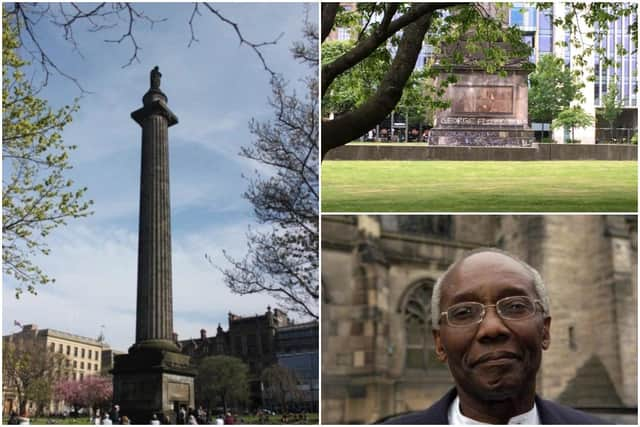Descendant of Scottish politician who prolonged slavery urges Edinburgh council to make changes to his ancestor's statue
A direct descendant of a Scottish politician responsible for delaying the abolition of slavery said he is “astonished” Edinburgh council has not acted on installing a plaque in the city to expose his ancestor’s contentious links to the slave trade.
Responding to a recent article in The Scotsman, Benjamin Carey, whose forebear Henry Dundas played a pivotal role in prolonging slavery, has demanded a narrative be written below his ancestor’s glorified statue in St Andrew Square to reveal the truth about the man’s controversial advocacy of slavery.
Advertisement
Hide AdAdvertisement
Hide AdDundas, the first Viscount Melville, who as first lord of the admiralty, deliberately prolonged slavery to protect the elite in the 1800s — forcing about 630,000 slaves to wait more than a decade for their freedom.


Activists have been fighting for the last two years to add narrative to the statue exposing Dundas’ unscrupulous legacy including Sir Geoff Palmer, Scotland’s first black professor, who has been part of the “plaque committee”, an expert panel set up to decide what should be written below the often celebrated leader.
Despite the Sir Geoff’s renewed call for the plaque this week, the council said it was not hosting any more meetings on the matter.
Mr Carey said: “I am astonished that in the midst of the current Black Lives Matter protests, the City of Edinburgh Council announced that it “will not be facilitating any further meetings” to “reword history on a statue memorialising [the] man who prolonged the slave trade,” Mr Carey said.
“There is now an opportunity for the council to admit the role of one of its most influential figures by supporting the plaque committee to complete its work as quickly as possible.
“My ancestor is controversial, but Edinburgh needs to own him, warts and all.
“As Mike Russell said yesterday (Twitter, 6 June 2020), ‘Let’s just get this done’.”
Mr Carey said in the wake of George Floyd protests reaching closer to home, the opportunity to be honest about the city’s ingrained links to the slave trade couldn’t be more apt.
Advertisement
Hide AdAdvertisement
Hide Ad“Henry Dundas was a controversial figure, who demonstrably used his influence to prolong the slave trade,” Mr Carey said.
“As one of his descendants, it is important for me and my family to openly acknowledge his role; I believe it is also important for Edinburgh and Scotland to fully understand its history.
“Historians who have researched my ancestor are clear that, had it not been for his obstruction as Home Secretary, Britain would have ended slavery in 1792, rather than waiting until 1807 to abolish the slave trade with slaves finally being emancipated only in 1838.
“I do not believe any of my cousins would object to the truth being told.”
Following Mr Carey’s plea for change and Black Lives Matter protests taking hold of Scottish cities over the weekend, council leader Adam McVey said he would “speak with council colleagues” and “try to get things resolved.”
Here is Benjamin Carey’s letter to The Scotsman in full:
“As an Edinburgh resident and a direct descendant of Henry Dundas, 1st Viscount Melville, I am astonished that in the midst of the current Black Lives Matter protests, the City of Edinburgh Council announced yesterday that it “will not be facilitating any further meetings” to “reword history on a statue memorialising [the] man who prolonged the slave trade” (6 June 2020), although I was encouraged to read that Council Leader Adam McVey has indicated a change of heart in response to Sir Geoff Palmer’s speech in Holyrood Park earlier today.
“Dundas was a controversial figure, who demonstrably used his influence to prolong the slave trade. As one of his descendants, it is important for me and my family to openly acknowledge his role; I believe it is also important for Edinburgh and Scotland to fully understand its history. Historians that have researched my ancestor are clear that, had it not been for his obstruction as Home Secretary, Britain would have ended slavery in 1792, rather than waiting until 1807 to abolish the slave trade with slaves finally being emancipated only in 1838. I do not believe any of my cousins would object to the truth being told.
“Dundas used his influence to protect the economic interests of the Tory elite of his day, which disregarded the human rights of millions. History has consequences, and its racist legacy can be seen in the Windrush scandal, response to Grenfell and other policies that suggest that black lives somehow don’t matter quite as much. The “compensation” paid to former slave owners in 1833 under the Slavery Abolition Act allowed many to reinvent themselves as philanthropists to be immortalised in street names, especially in Glasgow.
Advertisement
Hide AdAdvertisement
Hide Ad“Numerous institutions in Scotland have begun to examine how they have built on this legacy; last year the University of Glasgow showed leadership and imagination in its ‘reparations’ programme with the University of the West Indies.
“The personal influence of Dundas advanced the Scottish Enlightenment and ensured that Edinburgh got its New Town, which as a UNESCO World Heritage Site, makes a huge contribution to the city’s visitor economy.
“There is now an opportunity for City of Edinburgh Council to admit the role of one of its most influential figures by supporting the plaque committee to complete its work as quickly as possible. My ancestor is controversial, but Edinburgh needs to own him, warts and all. As Mike Russell said yesterday (Twitter, 6 June 2020), “Let’s just get this done”.
“Benjamin Carey FTS”
Comments
Want to join the conversation? Please or to comment on this article.